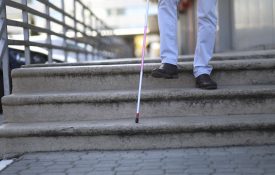-
A Meditation on the Art of Not Trying
The New York Times: Just be yourself. The advice is as maddening as it is inescapable. It’s the default prescription for any tense situation: a blind date, a speech, a job interview, the first dinner with the potential in-laws. Relax. Act natural. Just be yourself. But when you’re nervous, how can you be yourself? How you can force yourself to relax? How can you try not to try? It makes no sense, but the paradox is essential to civilization, according to Edward Slingerland. He has developed, quite deliberately, a theory of spontaneity based on millenniums of Asian philosophy and decades of research by psychologists and neuroscientists.
-
Who needs a hug? Anyone trying to ward off a cold this winter.
The Washington Post: Do you need a hug? If you're trying to ward off colds and the flu this winter — and who isn't? — the answer is yes, according to a study by Carnegie Mellon University researchers released Wednesday and scheduled for publication in the journal Psychological Science. "The apparent protective effect of hugs may be attributable to the physical contact itself or to hugging being a behavioral indicator of support and intimacy," Sheldon Cohen, a professor of psychology, and his team wrote.
-

Echolocation Acts as Substitute Sense for Blind People
Echolocation may not just help visually-impaired individuals navigate their environment, but may actually have the potential to be a complete sensory replacement for vision.
-
The Ulysses Strategy
The New Yorker: As the University of Chicago economist Richard Thaler tells the story, a group of fellow-graduate students in economics were at his house one night in the late nineteen-seventies, socializing before the dinner hour. Thaler saw how much they were snacking, and decided to remove the nut bowls from the living room. His colleagues—almost all of whom were ardent proponents of the idea that humans are rational decision-makers, optimizing their best interests through freely made choices—thanked him for removing the tempting snacks. Thaler took mental note of the moment, one of many notes on human irrationality that he would gather in the ensuing years.
-
Playing Nicely With Others: Why Schools Teach Social Emotional Learning
The New York Times: If your children’s school seems to suddenly be devoting its time and resources to something called SEL, it may be leaving you wondering what happened to good old reading, writing and arithmetic (or even that new darling, coding). You’re not alone. SEL stands for social emotional learning, and it’s a hot topic at the moment among educators with good reason.
-
Is the Justice System Overly Punitive?
Scientific American: Twenty years ago Rwanda was torn apart by violence. The Hutu majority slaughtered their Tutsi neighbors, killing approximately 70% of the Tutsi minority in the space of only four months. Once the killing finally stopped, a difficult question arose: how to right these monstrous wrongs without creating a cycle of revenge and retribution? Such a cycle would be the epitome of the ancient “eye for an eye” notion of justice, in which punishment is commensurate with the crime, an approach taken even today by most modern legal systems (including the United States). The aim is simple—when someone is wronged, the goal of punishment is to hurt the perpetrator.

